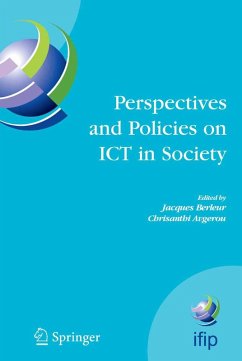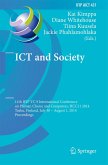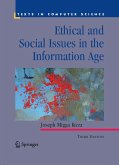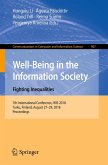Governments, the media, the information technology industry and scientists publicly argue that information and communication technologies (ICT) will bring about an inevitable transition from "industrial" to "information" or "knowledge-based" economies and societies. It is assumed that all aspects of our economic and social lives, in both the public and private spheres, will be radically different from what they are today. The World Summit on the Information Society (Geneva 2003 - Tunis 2005) shows the importance of a worldwide reflection on those topics.
The authors of this work explore the ICT policies of different nations and regions such as Africa, China, Europe, and India. They assess the arguments surrounding the impending new age, as well as some of the more sensitive issues of its developments. This progress will signal an expansion of ICT in many domains - the so-called ubiquity - such as in the workplace, the home, government, and education and it will affect privacy and professional ethics. The expansion will also encompass all parts of the earth, particularly developing countries. Such growth must take place in the context of historical dimensions and should underscore the accountability of professionals in the field.
The intent of this book is to address these issues and to serve as a handbook of IFIP's TC9 "Computers and Society" committee. Thirty authors from twelve countries consider the ICT policies with their associated perspectives and they explore what may be the information age and the digital society of tomorrow. The book provides reflection on today's complex society and addresses the uncertain developments rising from an increasingly global and technologically connected world.
Jacques Berleur is at the University of Namur, Belgium, and Chrisanthi Avgerou at the London School of Economics, United Kingdom.
The authors of this work explore the ICT policies of different nations and regions such as Africa, China, Europe, and India. They assess the arguments surrounding the impending new age, as well as some of the more sensitive issues of its developments. This progress will signal an expansion of ICT in many domains - the so-called ubiquity - such as in the workplace, the home, government, and education and it will affect privacy and professional ethics. The expansion will also encompass all parts of the earth, particularly developing countries. Such growth must take place in the context of historical dimensions and should underscore the accountability of professionals in the field.
The intent of this book is to address these issues and to serve as a handbook of IFIP's TC9 "Computers and Society" committee. Thirty authors from twelve countries consider the ICT policies with their associated perspectives and they explore what may be the information age and the digital society of tomorrow. The book provides reflection on today's complex society and addresses the uncertain developments rising from an increasingly global and technologically connected world.
Jacques Berleur is at the University of Namur, Belgium, and Chrisanthi Avgerou at the London School of Economics, United Kingdom.
Dieser Download kann aus rechtlichen Gründen nur mit Rechnungsadresse in A, B, BG, CY, CZ, D, DK, EW, E, FIN, F, GR, HR, H, IRL, I, LT, L, LR, M, NL, PL, P, R, S, SLO, SK ausgeliefert werden.
From the reviews:
"This book emanates from Technical Committee 9, 'Relationship Between Computers and Society'. It gathers papers from several members of this committee ... . they contain 'critical voices on the nature of and the social consequences' of this emerging concept. Thus, such a book deals with an important matter, and it should be read by anybody who feels concerned by the future and consequences of our science. ... For me, the important contribution of this book may be the large bibliographies that end most papers." (O. Lecarme, Computing Reviews, April, 2006)
"This book emanates from Technical Committee 9, 'Relationship Between Computers and Society'. It gathers papers from several members of this committee ... . they contain 'critical voices on the nature of and the social consequences' of this emerging concept. Thus, such a book deals with an important matter, and it should be read by anybody who feels concerned by the future and consequences of our science. ... For me, the important contribution of this book may be the large bibliographies that end most papers." (O. Lecarme, Computing Reviews, April, 2006)









